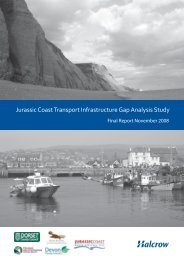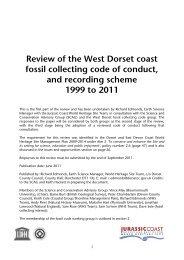Final Report to DEFRA - Jurassic Coast
Final Report to DEFRA - Jurassic Coast
Final Report to DEFRA - Jurassic Coast
Create successful ePaper yourself
Turn your PDF publications into a flip-book with our unique Google optimized e-Paper software.
Issues like coastal change, natural disasters and climate change illustrate the<br />
importance of geography in the curriculum in ensuring that future generations have<br />
the know-how <strong>to</strong> be resilient in the face of change, so the project had an additional<br />
aspiration <strong>to</strong> promote the subject.<br />
It was clear from the feedback, summarised in section 3.6, that, as well as better<br />
equipping students <strong>to</strong> understand issues like coastal change and promoting<br />
geography within schools, the project delivered a wide range of additional benefits.<br />
We believe that this project could be replicated in a wide range of coastal areas for<br />
relatively limited cost. This would ultimately lead <strong>to</strong> a significantly higher level of<br />
coastal literacy among the coastal residents and decision-makers of <strong>to</strong>morrow.<br />
Expectations are high – but can be managed<br />
Expectations on the role of the state in dealing with coastal change are very high,<br />
nowhere more so than in people’s perception of the ‘right’ <strong>to</strong> compensation for the<br />
value of property threatened by coastal change. The idea of ‘market value’ of such<br />
property has arisen often in the Pathfinder discussion and merits some scrutiny. Most<br />
homeowners at risk feel that the only acceptable alternative <strong>to</strong> coastal defence for<br />
their properties would be purchase by the state in some form at full market value, and<br />
this is often asserted on the assumption that the state has a legal obligation <strong>to</strong><br />
defend property which, of course, it does not. Clearly, if the state waits long enough,<br />
the ‘market value’ of at risk property will approach zero. Those homeowners who<br />
understand that there is no compensation mechanism are more inclined <strong>to</strong> accept<br />
that they are sitting on declining assets, and in terms of financial support <strong>to</strong> relocate,<br />
take the view that ‘something’ would be better than ‘nothing’. Others would regard<br />
anything less that ‘market value’ as unacceptable.<br />
Most residents we encountered were also unaware of the legal obligation on property<br />
owners <strong>to</strong> demolish property at risk. Many regard the up <strong>to</strong> £6,000 demolition grant<br />
introduced in 2009 as something of an insult, even though it technically puts them in<br />
a better position than they were before the grant was introduced. Many suggested<br />
that if they were losing a property they would simply walk away and take their<br />
chances with the possibility of enforcement action. This suggests that calculating the<br />
likely annual <strong>to</strong>tal of the demolition grants which might be paid out in future, and<br />
allocating this <strong>to</strong> a central fund (either nationally or locally) <strong>to</strong> ensure adequate clean<br />
up might produce more consistent results as well as more efficient delivery. The offer<br />
of a £6k grant is likely <strong>to</strong> result in £6k worth of expenditure, whereas co-ordinated<br />
public procurement of demolition services should lead <strong>to</strong> economies of scale and<br />
better specification of standards <strong>to</strong> which demolition should take place (e.g. in<br />
relation <strong>to</strong> environmental impacts). As more property is lost <strong>to</strong> erosion, the risk of<br />
coastal areas being strewn with the dangerous and unsightly remains of collapsed<br />
property will increase unless co-ordinated action is taken <strong>to</strong> address the problem.<br />
A key learning point for the project was that most people in property at risk were<br />
pragmatic and while there may be understandable emotional attachment <strong>to</strong> such<br />
property, we encountered very few people who would not be prepared <strong>to</strong> consider<br />
relocation if an appropriate package of support was available. This suggests that<br />
options for roll-back being looked at by other Pathfinder authorities should be given<br />
very serious consideration by Government, ideally being rolled out as part of a single,<br />
fair and transparent national system.<br />
27
















